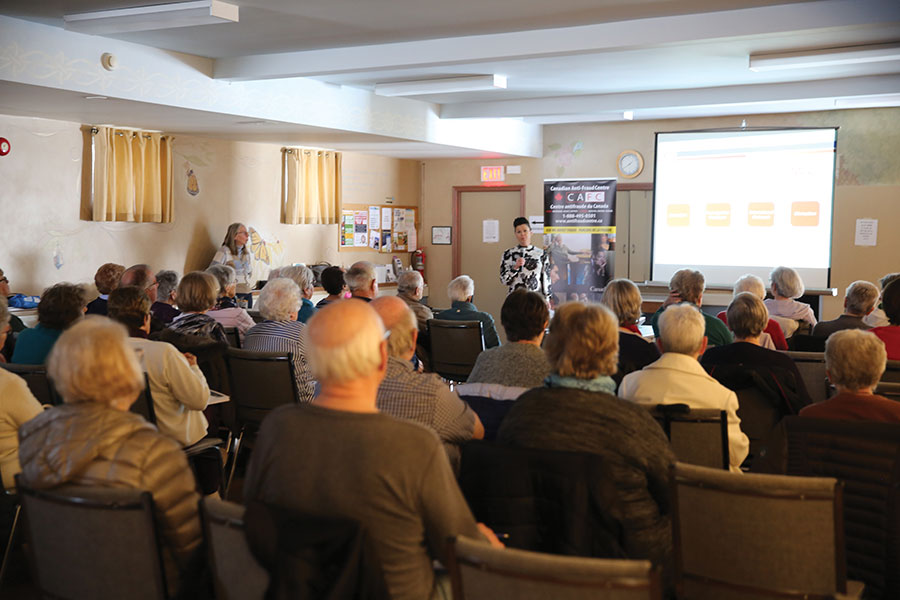FERGUS – March is Fraud Prevention Month in Canada and on March 8, St. James Anglican Church held a fraud prevention and awareness presentation.
The event, which was geared toward seniors but included information that can help everyone, covered topics such as the different types of fraud, recognizing the signs of scams and how to protect oneself.
Stephanie Senecal, senior support unit coordinator with the Canadian Anti-Fraud Centre (CAFC), led the discussion.
“Education is power. It’s the key to prevention.” Senecal told the group of around 60.
She dispelled the notion that it’s easy to avoid becoming a victim of fraud.
“Often people will say … ‘Oh I’m dumb, I got caught’ or whatever. But we need to realize that these people are professionals,” Senecal said.
“They’re con artists, and usually when someone becomes a victim it’s because they were caught at a bad time, which in turn would make them more vulnerable.”
In Guelph alone, between Jan. 1 and Feb. 28, there has been a reported loss of $450,000 due to investment fraud (one of many types of fraud).
Officials say it’s estimated only five to 10 per cent of victims file a fraud report with the CAFC.
“Seniors are the most vulnerable.” Senecal said.
“They’re the most targeted and they’re the ones who lose the most money; on average of about 33%.
“It’s important to educate them so they don’t become victims or re-victimized.”
The key message of the day was to keep personal and financial information safe – and never share it for any reason.
Media relations officer Josh Cunningham said Wellington County OPP investigates fraud on a regular basis, with approximately 350 calls in 2022.
“When only a fraction of fraud is actually reported to police, we can reasonably predict that there are many, many attempts every day in our community,” Cunningham said.
“They affect everyone; no matter your age, gender or intelligence, we are all susceptible to trickery.”
Fraud is evolving and can often take place over an extended period. It is a crime that is difficult to recognize. Reporting fraud can be done anonymously or on someone else’s behalf.
If you are a victim of identity theft and/or fraud, you should immediately complete the following steps:
– gather all information pertaining to the fraud;
– contact the two major credit bureaus (Equifax Canada and TransUnion Canada) to obtain a credit report and review;
– report the incident to police and the CAFC at www.antifraudcentre.ca;
– review financial statements and notify the affected agency if you notice any suspicious activity;
– notify your financial institutions and credit card companies, and change passwords to online accounts;
– if you suspect that your mail has been redirected, notify Canada Post; and
– notify provincial agencies that issue identity documents.
Senecal said residents should not be afraid to say no and they should not react impulsively.
Scammers often try to intimidate people with high-pressure sales tactics, but always stand your ground if something feels off. Request information in writing and scrutinize “urgent” requests and pleas that play on emotions.
Be aware of unsolicited calls, text messages or emails that ask you confirm or update your personal or financial information.
And whenever you’re in doubt, hang up.
Also don’t click an unfamiliar link or respond to the text asking to verify accounts. If you suspect you’re being targeted for fraud, err on the side of caution and steer clear.
In 2022, the CAFC received 90,438 fraud reports involving over $530 million in reported losses. Moreover, 16,894 of the reports were from seniors, that reported losses totalling more than $137.8 million.
While law enforcement and partners continue to work tirelessly to combat fraud, the general public has a huge role to play in protecting themselves and their communities.
“I found that doing presentations was just as important as reaching out to victims of fraud because if we can educate people, we can prevent it and will have less victims,” Senecal said.
“The goal for my team is to do as many presentations as we can virtually throughout Canada and in-person throughout Ontario.”
Officials say the COVID-19 pandemic exposed new vulnerabilities and increased the potential of fraud victimization.
Losses reported to the CAFC reached an all-time high of $383 million in 2021. In 2022, reports shattered that record, with $530 million in victim losses.
Everyone is encouraged to report fraud whether they’ve been a victim or not to the Wellington OPP at 1-888-310-1122 and the CAFC online or their toll-free number 1-888-495-8501.




